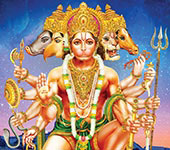Comments
Read more comments
Rejecting Swarga's Temptations
Knowledge Bank
Who are the three kinds of acharyas in yoga?
1. Chodaka: the motivator or inspiration for your entry into yoga 2. Bodhaka: the acharya who awakens you 3. Mokshada: the one who takes you to the final goal of self-realization.
Which are the sixteen adharas in the body?
The concept of the sixteen adharas has been elaborated in the book Siddha Siddhanta Paddhati of Guru Gorakhnath. They are special centers in the body focusing upon which confers immense benefit in yogic practice. They are: the tip of the thumb of the foot, muladhara, anus, base of the penis, between the penis and navel, nabhi or navel, middle of the chest, throat, uvula, palate, tongue, middle of eyebrows, the tip of the nose, the root of the nose, forehead, and brahma-randhra.
Transcript
(Click here to read more)
Once there was a king called Arishtanemi. A very just, efficient, and righteous ruler. When he became old, he handed over his royal duties to his son and proceeded towards Gandahmadana Parvata to perform tapas. He started observing severe austerities there. Indra called a messenger and said, 'Now take this chariot along with apsaras and Gandharvas and go to Aristanemi. Bring him to Swargaloka in the accompaniment of music and dance. He deserves Swargaloka, as he has done a lot of meritorious deeds.' Accordingly, the deva duta went to Arishtanemi and told him the purpose of his ....
Transcript
(Click here)
Once there was a king called Arishtanemi. A very just, efficient, and righteous ruler. When he became old, he handed over his royal duties to his son and proceeded towards Gandahmadana Parvata to perform tapas. He started observing severe austerities there. Indra called a messenger and said, 'Now take this chariot along with apsaras and Gandharvas and go to Aristanemi. Bring him to Swargaloka in the accompaniment of music and dance. He deserves Swargaloka, as he has done a lot of meritorious deeds.'
Accordingly, the deva duta went to Arishtanemi and told him the purpose of his coming. Arishtanemi thanked him and asked, 'What is there in Swargaloka?' Everyone has read or heard about Swargaloka, but this messenger is coming from Swargaloka, so he should know first-hand what is there. The deva duta said, 'There are all kinds of ananda pleasures in Swarga. According to how much good you have done on earth, you will enjoy in heaven. There are gradations; it is not that the heavenly experience is uniform. The most meritorious get the most enjoyments and pleasures, then there is one level below that, and one level below that. It all depends on how much good you have done. Accordingly, you get the level. So there is an upper level, middle level, and lower level. Like the first class, business class, and economy class air travel. Like the presidential suite, deluxe room, and standard room in a luxury hotel тАУ different levels of comforts. The more you pay, the better you get. In Swarga, you don't pay anything. You are assigned to a deserving class according to what you have done on earth. But then, whatever is there on earth is also there in heaven. The ones in the lower level are jealous towards the ones in the middle and upper level. The ones in the middle level are jealous towards the ones in the upper level and scornful towards the ones in the lower level. Ones in the upper level think that they are above all and have their eyes more on how less privileged are those in the middle and lower level compared to them, rather than enjoying what they got. They spend more time making these comparisons and reassuring that they are the best. It is the same situation there also тАУ like those advertisement catch lines - 'You deserve the best, nothing less than the best for you.' Between those at the same level, there is jealousy, envy, fight, competition, gossiping, badmouthing everything. After some time, after enjoying as much as there is in your account, when your balance becomes zero, you come back to earth taking another birth.'
So, the duta told Arishtanemi, 'This is what happens in heaven.'
Arishtanemi said, 'No, I don't want to go there.' So, the deva duta went back with an empty chariot. There are people who
Recommended for you
Nature- this word came into English from Sanskrit

Do you know why Shani Deva does not harm the devotees of Hanumanji?

Lakshmi Stuti

рдЖрджрд┐рд▓рдХреНрд╖реНрдорд┐ рдирдорд╕реНрддреЗрд╜рд╕реНрддреБ рдкрд░рдмреНрд░рд╣реНрдорд╕реНрд╡рд░реВрдкрд┐рдгрд┐ред рдпрд╢реЛ рджреЗрд╣рд┐ рдзрдия┐╜....
Click here to know more..